Enough is enough: reports from the key speeches at this year’s Annual Delegate Conference
“The pantomime villain”
FDA General Secretary Dave Penman calls on ministers to “demonstrate they value civil servants” and pushes back against attacks on civil servants
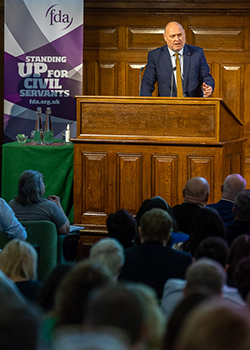
The General Secretary reminded delegates of the litany of government actions in the last 12 months and beyond, that have left the morale of civil servants at a historic low – the announcement of the 91,000 job cuts, constant political attacks and the sacking of Tom Scholar to name just a few. Penman argued that “years of undermining, politicisation and insulting behaviour from ministers” has been an attempt to paint civil servants as the “pantomime villain”.
Penman reminded the Prime Minister that he entered Downing Street promising a “government of integrity and accountability”.
However, Penman addressed the bullying of civil servants by former Deputy Prime Minister, Dominic Raab, and the absence of process or standards in how this was handled by Rishi Sunak. Although Adam Tolley KC’s report led to Raab’s resignation, Penman did not view this as a good news story for the civil service:
“Then the report made clear that Raab was a bully, the Prime Minister dithered, allowed him to resign rather than sack him, and offered him the opportunity to dismiss the report and its conclusions, name one of his accusers and undermine the entire process… Raab’s 2,000 word essay in the Telegraph spoke with greater clarity of his character than even Tolley’s report did – belligerent and unapologetic.
“Meanwhile, the victims of Raab’s bullying were left to sit at home or in the very offices they shared with him, watching this unfold across the news channels. They were apparently not even deserving of a letter to explain the outcome.”
Penman argued that having told civil servants they think they are a “pantomime villain… lazy, woke, inefficient, remainer, activist, snowflake”, the government and Raab now claim they are “Machiavellian geniuses, able to unseat ministers and undermine the settled will of government”.
The General Secretary also shared the sobering results of the FDA’s survey of senior civil servants: “70% said they had no confidence in the system for raising complaints. One in six reported misconduct from ministers in the last 12 months alone across more than 20 departments. Demonstrating clearly Raab cannot be dismissed as just a bad apple.”
Penman strongly rebutted Raab’s accusations that the FDA was targeting ministers: “The FDA has no hit list of ministers. The FDA does not go around encouraging complaints – but the FDA has, and it always will, stand up to bullies on behalf of its members. As Tolley made clear in his report Mr Raab, maybe if you spent a bit more time looking in the mirror, and a bit less time looking for reds under the bed, things might have turned out different for you.”
“Second-class public sector workers”
On pay, Penman told conference that a tough previous year, dominated by a cost-of-living crisis that continues to affect all members, was compounded by the lowest pay rise in the public sector for 2022 and the government’s brazen decision to ignore the recommendations of the independent Senior Salaries Review Body:
“In the Senior Civil Service, we have been promised pay reform and competency-based pay for nearly half a decade. Ministers complain about the turnover of senior staff but refuse to pay for a system that would address the reasons why people are incentivised to move from job to job.”
“Whilst the government was hiding behind pay review bodies over the winter of discontent, they failed to mention that there was one review body they refused to implement in full, and who could have guessed that would have been the one that dealt with their own senior civil servants.”
Speaking before the government had offered a revised pay package, which led to the cancellation of the FDA’s proposed ballot for industrial action, Penman described the early promise for 2023 arising from pay meetings with the Minister for the Cabinet Office Jeremy Quin. The General Secretary stated that Quin had “promised us enhanced dialogue” and a non-consolidated payment to address the cost-of-living that would match other areas of the public sector.
However, any early promise quickly turned to silence and frustration as over the course of a single day, with no warning or negotiation, a pay remit was imposed with no additional cost of living compensation – as had been previously promised. “Why the U-turn?”, asked Penman. “Why, once again, treat the civil service as second class public sector workers?”
“The rug had clearly been pulled from under the feet of the civil service leadership – political and official. Whoever had made the decision to treat the civil service so blatantly different from elsewhere, they were not concerned about the impact this would have. I doubt, to be honest, whether they even cared.”
Penman described the cynical reasoning for this U-turn, encapsulating the current government’s strategy, or lack thereof, for the civil service:
“It was a decision to send a message elsewhere. A government that had shown time and again that it didn’t know how to negotiate with unions, was having wobbles over the votes in health and education. Send a message that we can play hardball, that’s all the civil service is good for, who cares what impact it has? The civil service was, once again, being handed around government as a convenient tool to make whatever point was deemed more important.”
On top of poor pay, unreasonable workloads and the threat of job cuts have not gone away. The Sunak government “may not be pursuing the 91,000 job cuts” said Penman, “but withdrawing an idiotic, undeliverable policy is not, in my book, handing out favours. Workloads are still increasing and resources are frozen as inflation delivers real terms cuts to budgets.”
“At some point we need to say enough is enough” and “ministers need to demonstrate they value civil servants”.
Finding the best obtainable version of the truth
The Guardian’s Political Editor Pippa Crerar speaks to the FDA’s Annual Delegate Conference about the principles that drive her investigative journalism, and reflects on how the civil service has been caught up in a wider culture war.
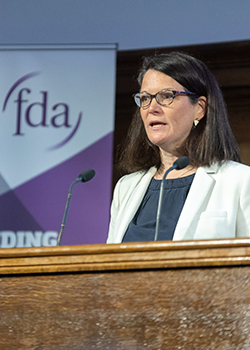
“Things are not what they seem on the surface. Dig deeper, dig deeper, dig deeper.” Pippa Crerar begins her speech to the FDA’s Annual Conference by quoting the words of the great newspaper editor Sir Harry Evans, who “championed investigative reporting and whose mantra is still followed by many journalists, including me”.
Crerar had attended a conference held in his memory the previous day, and spoke of the privilege of hearing from Bob Woodward and Carl Bernstein, the reporters who uncovered the Watergate Scandal. She was struck by their observation that good investigative journalism was about getting “the best obtainable version of the truth”. She reflected that, “how good that version of the truth is, actually comes down to sourcing. And, in my world, that means people – officials, politicians, members of the public – trusting in me enough to share what’s going on behind the scenes and beyond the spin.” Woodward and Bernstein had also added the caveat that the truth is “not always neutral. Or as we hacks sometimes put it, if someone tells you it’s raining and another person tells you it’s dry, it’s not your job to quote them both. It’s your job to look out of the window and find out which is true.”
Crerar pointed out that there were challenges for journalists now that had not existed at the time of the Watergate scandal, which “remains the gold-standard in investigative journalism”, with the advent of social media and twenty-four news cycles, and accepted that “the media is by no means unimpeachable”. However, she argued “the vast majority of us are in it for the right reasons and motivated by public interest. We’ve had a busy few years in politics, particularly in British politics… so it feels more important than ever to hold the government properly to account”.
This was clearly shown in May 2020 when, “with some trepidation”, Crerar made contact with someone who had apparently spotted Dominic Cummings “260 miles away in County Durham during the COVID lockdown”. Cummings was the “most powerful unelected official we’ve seen in decades”, and “it took weeks and weeks of empirical research, knocking on doors and speaking to contacts, all in the face of obfuscation, denials and downright lies”, to stand up the tip and be able to publish the story. The following day, a reader got in touch to say they’d also seen Cummings “in a pretty market town called Barnard Castle. And the rest of that particular story is history.”
In late 2021, Crerar would again be presented with evidence that powerful figures in government had breached COVID rules, this time involving the then-Prime Minister Boris Johnson and others holding gatherings in 10 Downing Street. “I had no idea at the time how the story would play out politically, but I was certain that the public would care”. She was also aware that “beyond people like the FDA, and former Permanent Secretaries prepared to go public, civil servants don’t often have a voice in all of this”. The lack of a public voice for civil servants was ever more apparent with the next big probity scandal taken on by Crerar.
Deciding to “look into allegations that had been swirling around the Deputy Prime Minister (Dominic Raab) for years”, and conscious “that bullying could be subjective”, Crerar spoke to as many people as possible off the record who had worked with him to establish Woodward and Bernstein’s “best obtainable version of the truth”. “It was a huge leap of faith” for those officials and political aides, and Crerar had hoped that Raab’s departure from government “would allow them some closure”. However, Adam Tolley KC’s “understandable desire to preserve the anonymity of complainants and witnesses”, meant that some of those who had come forward felt the report included “very little detail of what had actually gone on”. That, coupled with Downing Street “allowing Raab to set the narrative” around his departure, left them feeling that he’d managed to “diminish the severity of his actions” and created an opportunity for a broader attack on the civil service, adding “I know they find that hard”.
Crerar believes that “change is coming” both for journalists and the civil service beyond the next General Election, regardless of who is in Number 10, and that it could allow the civil service “an opportunity to reset the relationship with government”. She adds that “the vast majority of ministers are motivated by all the right reasons, they’ll listen to the advice, and constructive criticism, of civil servants, and will take that on board. Unfortunately, there are a few who don’t, and in the last few years, the civil service has been caught up in a much broader culture battle which has emerged post-Brexit, which is about pitching ‘elites’ against ‘ordinary people’”. She thinks that civil servants have been “a useful enemy” for some, but hopes that whether it is Rishi Sunak or Keir Starmer in Downing Street, that will start to change.
Crerar, however, will continue to call out poor behaviour, particularly where civil servants do not have a voice of their own: “I see it as my job, and the job of my colleagues across the lobby, to call that behaviour out”.
Overcoming personal bias
“none of us is a clean slate”
Raising expectation without understanding what’s deliverable
Former Lord Chancellor and Secretary of State for Work and Pensions David Gauke on the “more contentious” relationship between ministers and officials, and why ministers’ and journalists’ “failure to engage with the details” has led us to our current situation.
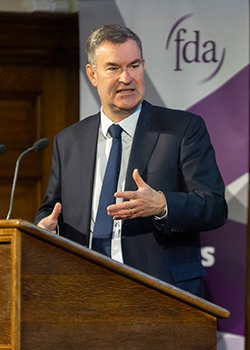
Having had “the privilege of being a minister for nine years”, Gauke told conference that “the challenges we faced were immense and I’m grateful I faced them alongside many outstanding civil servants who were hardworking, thoughtful, intelligent and motivated by the desire to serve the public and I want to take this opportunity to say thank you”.
Gauke added: “It also pains me to see that relationships between ministers and officials have become more contentious in recent years. There are many ministers who speak very highly of officials and officials who speak highly of ministers, or at least some of them. But we all know that there are some specific controversies and behind that. A wider criticism of the civil service that it is obstructive and has failed to implement the agenda of the government.”
The former Lord Chancellor outlined criticisms such as these as “an example of people – sometimes ministers, sometimes journalists – refusing to address complex situations and coming up with simple answers as to why simple promises cannot be fulfilled when confronted by reality. The blame gets put on ‘the blob’ or the out-of-touch elite and for these purposes, this is [FDA members].”
Gauke called this “wrong for two reasons – a refusal to accept complexity and the need for trade-offs… and second, ministers have to take responsibility, for they are the ones who make decisions. When it comes to negotiating the terms of our exit from the EU, our immigration policy or post-Brexit regulation, it is ministers who decide and ministers who should be taken to account.”
“Better that politicians become columnists than columnists become politicians”
On Brexit, Gauke called it “a source of much wishful thinking and failure to engage in the details by politicians”, adding “I think there is a remarkable correlation between those who fail to understand the details and those who have been most critical of the civil service”. Gauke described it as “just one example of the electorate being provided with great promise of what could be delivered, with little idea of the practicalities or how to deliver them”. He referred to “levelling up as another example, where politicians raised expectations without understanding whether those expectations were deliverable”.
He outlined the problem as “politicians who have spent a lifetime ignoring the details and complexities, who see policy issues as primarily a way of asserting an identity or winding up opponents, or advancing themselves within their own party, rather than a means of solving problems. Without focusing on any one individual, I can tell you it is much easier to write columns about government policy than to devise and implement one. Better that politicians become columnists than columnists become politicians.”
As a minister, Gauke “considered it part of the job of officials to share bad news. Now if that was the duty of officials, the duty of ministers is to give officials the confidence to do precisely that. If ministers subsequently believe that not every consequence of a high-risk fiscal strategy was set out to them by their civil servants, they have only themselves to blame”.
The future of the civil service
On civil service reform, Gauke described himself as “something of a traditionalist, favouring an independent civil service in which senior officials do not change in a change of government or that ministers have great power in the appointment of senior officials.”. In his view, “the perverse incentives this creates, the waste of talent and expertise and the difficulties of transition from one administration to another all suggest this would be detrimental”.
He admitted he must “recognise that voices for such reform are growing”. While “many on the right believe the civil service is hostile to a political agenda”, Gauke feels “it is also the case that as a matter of statistical probability, an organisation consisting to a great extent of youngish graduates living in London and working in the public sector is not an overwhelmingly Conservative demographic – this does not mean that they can’t do their jobs”. Gauke added that he would argue that the fault may lie with his “former party, [who] should do more to appeal to youngish graduates living in London and working in the public sector”.
Whatever happens in the future, Gauke underlined that “it is so important that the values of the civil service must be maintained, truth to power and implementing ministerial decisions once made… that ethos has to be protected”.
Related News
-
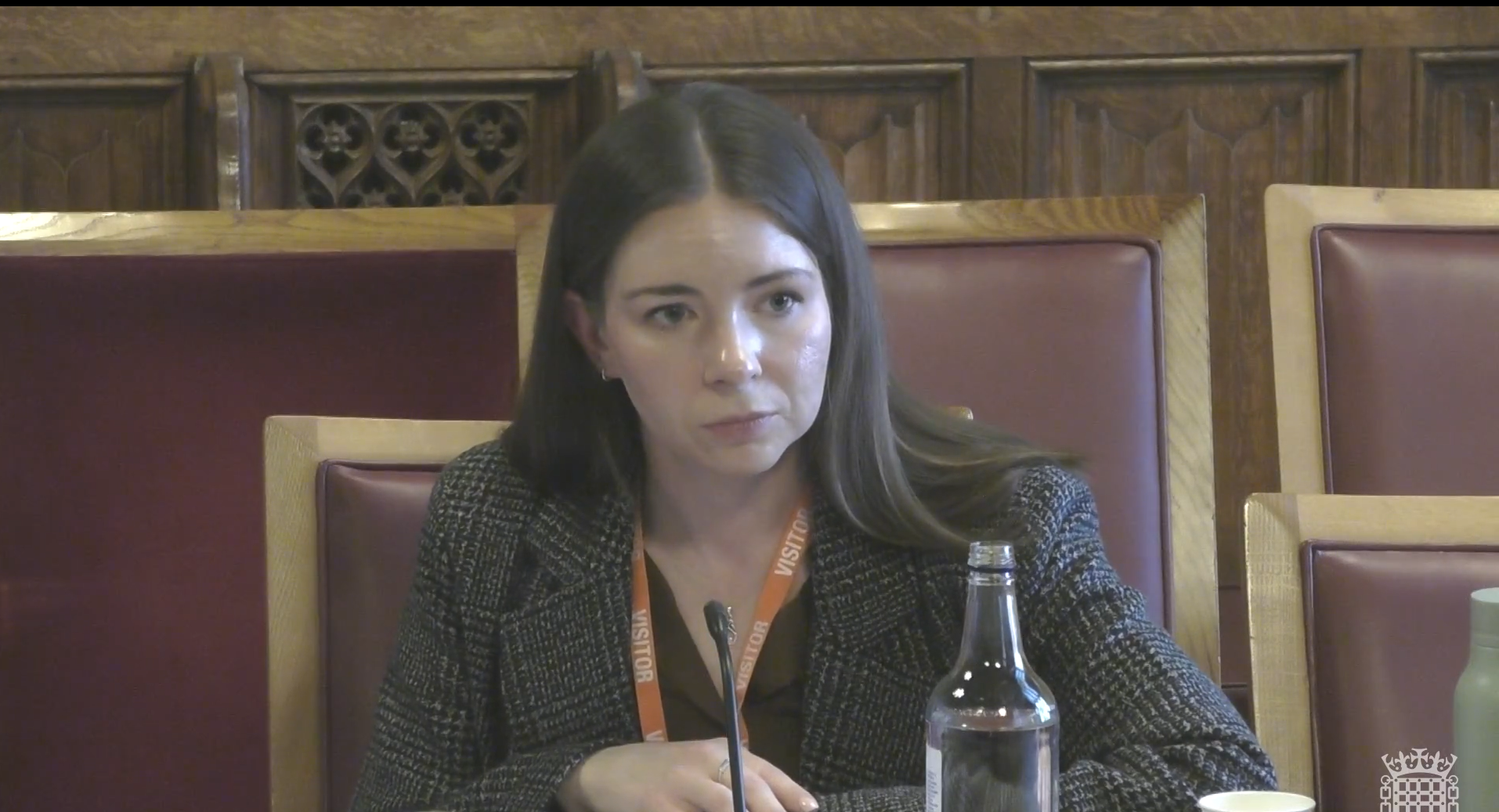
Office attendance mandate “doesn’t make sense”, Crowley tells House of Lords Home-based Working Committee
FDA Assistant General Secretary Lauren Crowley gave oral evidence to the House of Lords Home-based Working Committee for its inquiry on remote and hybrid working.
-
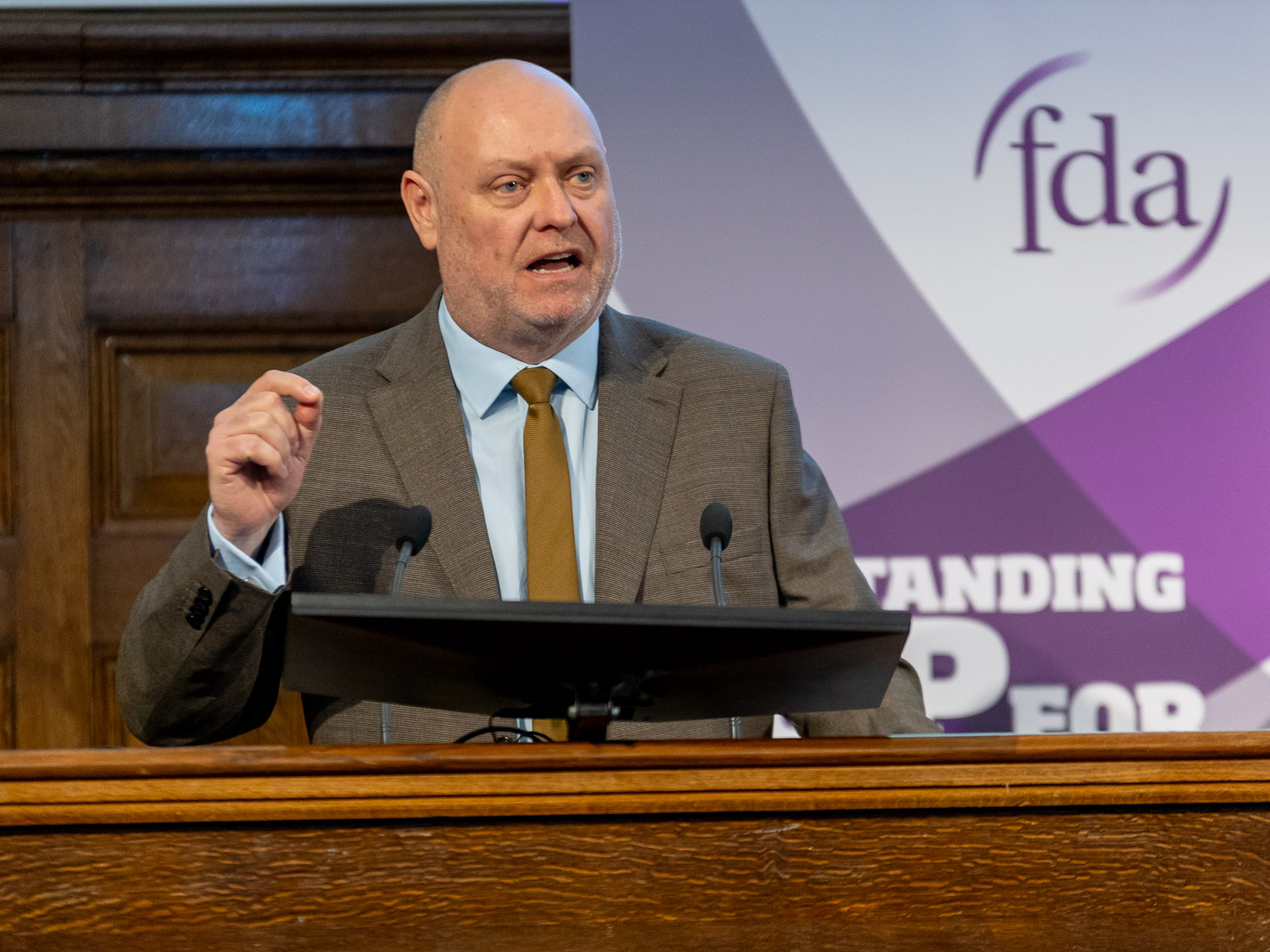
“FDA is not afraid of civil service reform, but it has to have substance”
FDA General Secretary Dave Penman responds to the government’s latest announcement on the reshaping and renewal of the state.
-
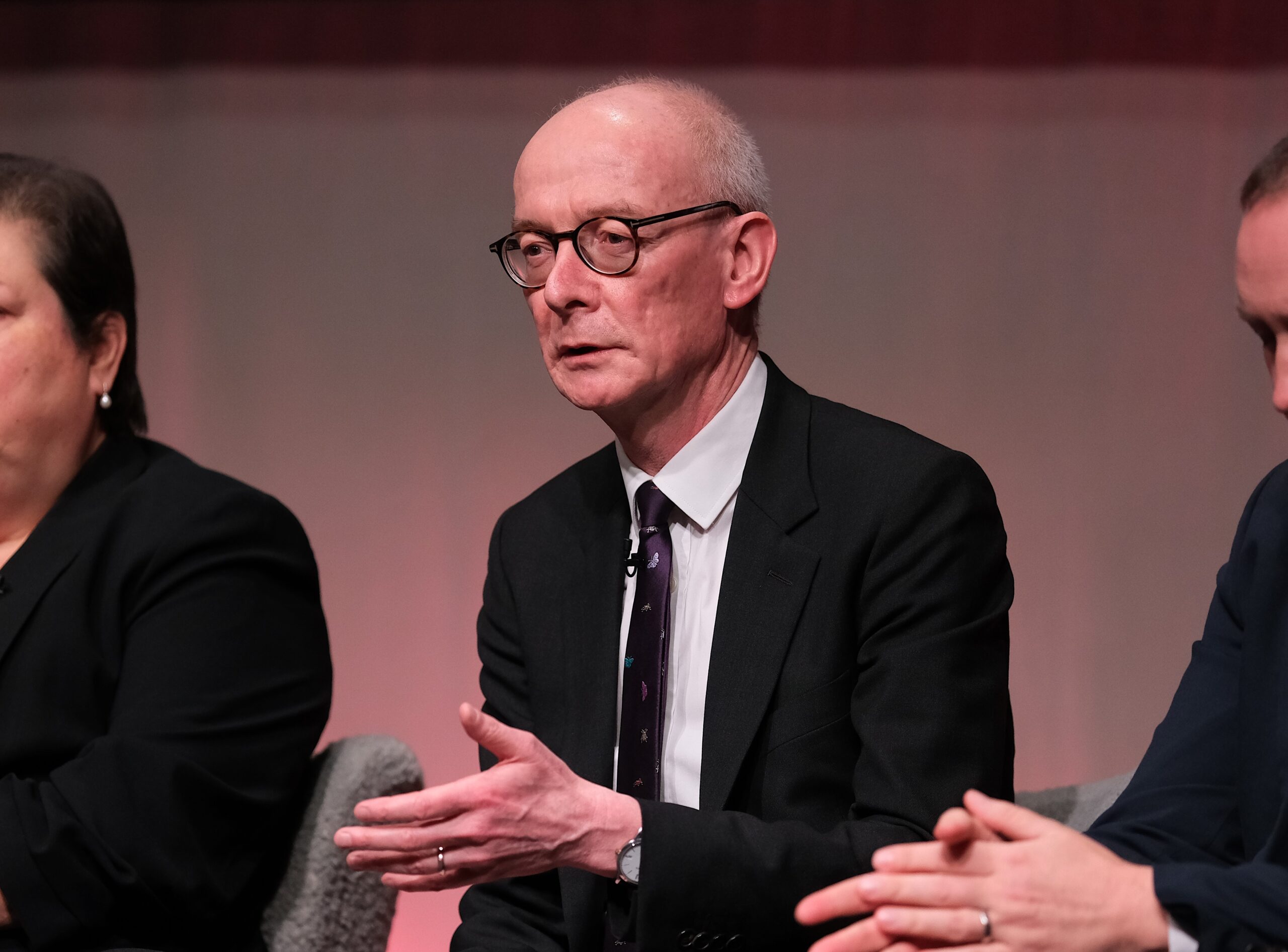
Government’s plans for civil service reform “lack substance”, says FDA
The FDA has criticised the government’s rhetoric surrounding the announcement of a series of civil service reforms – on performance-based pay, fast track exits for underperformers, and performance management – by Chancellor of the Duchy of Lancaster Pat McFadden.